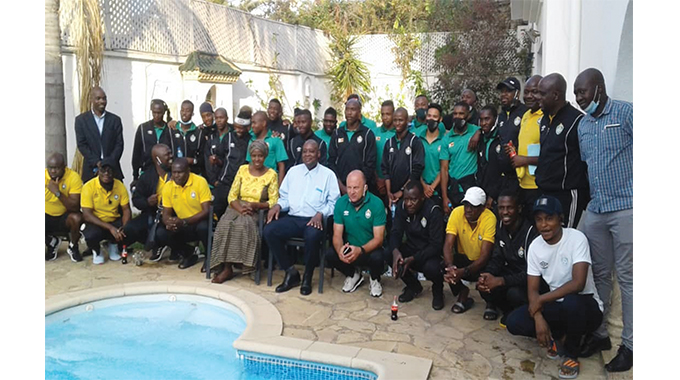35-year-old battles rare condition everyday

Thandeka Moyo-Ndlovu, Health Reporter
THE world with its nearly 8 billion people can still be the loneliest place in the universe if you suffer from a devastating condition that is so rare that it affects only one in about 5 000 births.
A condition so misunderstood that society bullies and ridicules you instead of being empathetic.
While most human beings take about two minutes pooping daily, Mr Tinotenda Mudarikwa (35), who was born with a rare condition – imperforate anus (IA) – has been forced to spend at least 45 minutes daily on the toilet seat struggling to relieve himself.
He has endured shame, stigma and labelling all because he was born “without an anus”.
An imperforate anus is a birth defect that happens while a baby is growing in the womb but for Tinotenda, his family and friends claimed his condition was a result of a curse.
A majority of people born with the condition die while still young.
This defect, according to medical experts, means from the time Tino was conceived he had an improperly developed anus, and therefore cannot pass stools normally from his rectum.
He grew up being labelled “stinking boy”, a black sheep and an “ugly smelling duckling” destined to die an outcast.
Tinotenda recalls how he soiled himself “a million times” during school since he has never been able to control his bowels, only to be made fun of by other children and teachers who didn’t know he was living with a rare condition.
“Often, I had to change my undergarments and I had no one to confide in or understand what I was going through at that time. I had no friends and other pupils used to call me all sorts of names. I remember they nicknamed me ‘stinking guy’,” he says.
“I was the last person people wanted to sit with in class and the more I grew, the more pain I endured every time I tried going to the toilet. On average, I could be in the toilet for about 30-45 minutes battling, struggling and at times failing to defecate and that has become very normal for me.”
He adds that he has undergone three surgeries in his life to rectify the problem, without success.
“The word ‘toilet’ continues to play such a pivotal role in my life. Growing up I dreaded the toilet seat especially a public one like when I was in a boarding school, toilets were always dirty. Then I would even prefer using it maybe once a fortnight whenever my group was on cleaning duty,” says Tinotenda.
He says his sorrowful life ended in 2017 when he found an Australian, Greg Ryan, on Facebook who introduced him to the ‘Adults living with IA/(anorectal malformations) ARM’ support group.
Greg was the first person that made Tino accept his condition fully and he also lent a listening ear.
“Joining this group liberated me from the psychological prison I was in all my life. It was consoling and comforting to learn that there are other folks out there who were born with my exact same condition; some even worst-case scenarios,” he says.
“Rare diseases only affect a small number of people unlike HIV and Aids, cancer, cholera and malaria. More resources and media exposure is given to these diseases that affect the masses and often rare diseases like imperforate anus are ignored.”
Tinotenda’s mother, Ms Winnie Moyo, says raising her first born son was emotionally draining although, she has always been convinced he was a special boy.
Wistfully, she recalls her anguish when Tinotenda underwent an unsuccessful operation when he was two days old to correct his condition.
“I had to undergo a Caesarean section operation to deliver Tino, my first-born child, only to be told he needed an emergency surgery two days after his birth. His life had always been marred with pain and tears and I recall how twice he wanted to drop out of school because he was always being ridiculed for his condition,” says Ms Moyo.
“I remember vividly how every day I had to wipe his tears after school after being labelled and laughed at because he was stinking. I had to do my best to ensure he was clean but he had tough school days, especially when he went to Thekwane High School.”
According to Ms Moyo, Tinotenda could have passed his O-levels with flying colours had he been a normal child though she is still grateful he completed his studies.
“Tino was offered a place at Mpopoma High School for A-level but due to his condition he decided to quit and never finished his studies. However, I am happy because despite all this, God has been faithful. My son is doing well in life.
I actually didn’t think he would live to this day because children with his condition would die in infancy.”
Tinotenda’s mother adds that she was made to believe he was suffering as a result of witchcraft but she has since discovered it’s a rare condition.
“I know we have women who may have children living with disabilities and we know our society is not kind enough to accept that such can happen. I encourage them to embrace these God given gifts because He has great plans for each and every one of them despite condition and disabilities.”
To assist bowel movement, Tinotenda has to use an enema (ukupeyita) to help him defecate every day.
Despite being a laughing stock throughout his childhood, Tinotenda successfully registered a non-profit organisation called Rare Diseases & Disabilities Africa Foundation (RaDDA) in 2018 to address his condition as an invisible disability.
He was also selected to be part of the 44 Southern Africa changers who benefitted from the Young African Leaders Initiative (Yali) and Trevor Noah Foundation project.
“In addition, the Government of Zimbabwe through its Ministry of Health and Child Care is currently drafting a Memorandum of Understanding with RaDDA Foundation to support this cause and recognise Rare Disease Day officially in the country.
“I was messing myself in my adult life so I couldn’t open up to anyone, hence I would hop from girl to girl. However, I am grateful because I paid lobola in May this year and got married on September 25 despite everything. We are expecting our first child and I am happy.”-@thamamoe









Comments